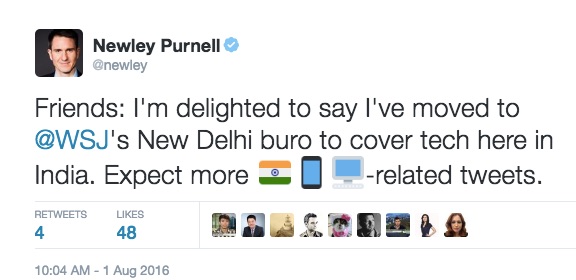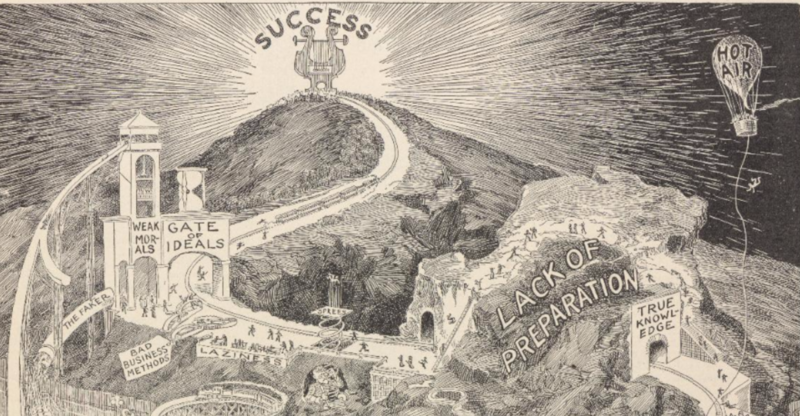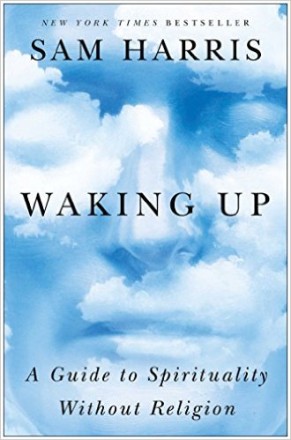
More on this in future posts, but…A and I moved to India! I’m penning this post from New Delhi, our new home after two and a half years in Singapore.
Above is a Tweet I posted sharing the news. Below is the Newley Notes missive in which I explain a bit more.
I’m very excited about this new adventure. Expect more posts on India, tech, and life in the world’s second-most-populous nation.
Hi friends,
Thanks for reading Newley’s Notes, a weekly (most of the time) newsletter in which I share my WSJ stories, posts from my blog, and various interesting links.
This is a special edition: it’s the first one I’m penning from New Delhi, our new home!
Anasuya and I moved here from Singapore about a week and a half ago — hence the weeks-long Newley’s Notes absence — and are settling in well so far.
I’ll be working out of the WSJ bureau here in the capital of the world’s second-most-populous country. I’m so, so excited to be in this vibrant, dynamic nation, and to be able to focus more on tech developments here. And having family and friends nearby is a huge bonus.
It’s an exciting time for India, a country of 1.3 billion where people are increasingly coming online for the first time, many on low-cost smartphones.
How is technology changing their lives? Is it improving them? What are some of the world’s biggest tech firms — Facebook, Google, Amazon, Uber — doing to win here? How are local startups innovating? These are questions I hope to answer in my stories.
On to this week’s edition.
What I wrote in The WSJ
Grab, an Uber Rival in Southeast Asia, Is Set to Raise $1 Billion
The story, which I wrote with two exceptional colleagues in Hong Kong, begins:
As Uber Technologies Inc. turns away from China, a competitor is raising funds to cement its dominance in Southeast Asia and fend off the tech titan based in San Francisco.
Uber’s decision to sell its China business to Didi Chuxing Technology Co. is giving Singapore-based Grab renewed confidence it can take on Uber and win on its home turf. Grab says it has captured much of Southeast Asia’s ride-hailing market with more than half of private-car rides in the region.
Valued at $1.6 billion in its previous funding round, Grab is planning to raise about $1 billion in fresh capital from investors including Didi and Japan’s SoftBank Group Corp.,a person familiar with the situation said Wednesday. The first chunk of that fundraising, a $600 million dose, is expected to be completed this week, the person said.
How Uber Plans to Avoid Getting Didi-ed in India
The story begins:
Uber is upping its game in India following its retreat from China.
The San Francisco ride-hailing company earlier this week gave up its costly battle for users in China, selling its business there to homegrown rival Didi Chuxing Technology Co…
What I wrote at Newley.com
Three additions to my “book notes” series of posts, in which I share notes from my readings.
Book Notes — ‘Never Eat Alone,’ by Keith Ferrazzi and Tahl Raz
Brief recap: A popular book about the power of networking. I didn’t find it revelatory, but appreciate the central theme, which is common sense: that you should help friends just to help them, not because you expect something in return. In other words, as the author writes, networking can be a huge advantage – but don’t keep score.
Book Notes — ‘Deep Work,’ by Cal Newport
Brief recap: Newport, an assistant professor of computer science at Georgetown University, argues that knowledge workers must devote themselves entirely to the most sophisticated and valuable contributions they can make – they must concentrate on what he calls “deep work.” Common sense, yes, but the book provides some compelling insights and plenty of practical tips. Highly recommended.
Book Notes — ‘Den of Thieves,’ by James B. Stewart
Brief recap: An absolute classic. Pulitzer-prize winning Jim Stewart tells, though in-depth reporting and riveting storytelling, the story of the insider trading scandals that rocked Wall Street in the 1980s.
5 items that are worth your time this week:
1) Nice Cargo Shorts! You’re Sleeping on the Sofa
A lighthearted WSJ story out of New York that blew up online — we’re talking 83,000 Facebook shares and 600 comments. The nut graf:
Relationships around the country are being tested by cargo shorts, loosely cut shorts with large pockets sewn onto the sides. Men who love them say they’re comfortable and practical for summer. Detractors say they’ve been out of style for years, deriding them as bulky, uncool and just flat-out ugly.
2) After you’ve read that, check out this hilarious Vice piece, in which the author unpacks the WSJ story.
3) When LBJ Ordered Pants From the White House
Speaking of clothing, this is not new, but new to me. Visit the link and scroll down to the hear the remarkble audio of a phone call Lyndon Johnson made to the Haggar clothing company in Dallas in 1964. Audio is possibly NSFW, given graphic anatomical descriptions — not to mention audible burping.
4) America Seen From Abroad: Arrogant, Nice, Tech-Savvy, Free
I love this. The AP asked people all over the world for their impressions of Americans.
One of my favorites:
— “America? Uhh, that’s a huge country. Burgers, the American dream, choppers, … Elvis, cowboys. We dream of America and they dream about Europe. But one thing for sure, they cannot make beer.” — Knut Braaten, 43, handyman, Oslo, Norway.
5) App of the week: Prisma, which turns “every photo into art.” It’s like Instagram, but it makes your pics way cooler.
Have a great week, and let me know what’s new in your world.
@Newley
P.S. If someone forwarded you this email, you can subscribe here.
Newley.com | Twitter | Facebook | Instagram




 Book: “Waking Up”
Book: “Waking Up” Again, I’m kind of cheating here.
Again, I’m kind of cheating here.  Serious “Star Wars” nerds
Serious “Star Wars” nerds  Holy shit, “
Holy shit, “